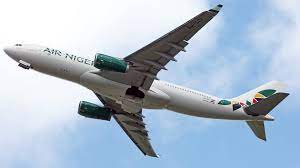In the ever-changing landscape of African aviation, the headlines are often filled with news of airline expansions, new aircraft acquisitions, and burgeoning international partnerships. However, recent events have thrust two key players in the African aviation industry – Nigeria Air and the Boeing 737 – into the spotlight, but not for the usual reasons.
In a surprise development, Nigeria’s aspiring national flag carrier, Nigeria Air, was denied its Air Operator’s Certificate (AOC). Meanwhile, in a significant turn of events, the iconic Boeing 737 has made its triumphant return to Ethiopia. What led to these circumstances, and what do they mean for the future of African aviation? Let’s delve into the details.
Nigeria Air Denied AOC: An Unexpected Setback
In a move that shocked many aviation enthusiasts and industry watchers alike, Nigeria Air, the soon-to-be-launched Nigerian airline, was denied its Air Operator’s Certificate (AOC) by the Nigerian Civil Aviation Authority (NCAA). An AOC is the approval granted by a national aviation authority that allows an airline to operate aircraft for commercial purposes.
This denial has postponed the much-anticipated revival of a national carrier for Nigeria, a country that has been without a flagship airline since the collapse of Nigeria Airways in 2003. There’s a lot of speculation about the reasons behind the NCAA’s decision, but it is clear that this setback will significantly impact the launch timeline for Nigeria Air.
The denial of the AOC underlines the rigorous standards that airlines must meet to ensure safety and compliance. While the specific reasons for the denial have not been made public, it is common knowledge in the industry that an airline must demonstrate its competency in operations, maintenance, and safety systems to secure the AOC.
Boeing 737 Returns to Ethiopia: A Symbolic Comeback
In contrast to the disappointing news from Nigeria Air, Boeing’s 737 model has made a noteworthy return to Ethiopian Airlines’ fleet. This marks a significant milestone as it’s the first time the airline has reintroduced the model since the tragic crash in 2019 that shook the aviation world.
The reintroduction signifies the Ethiopian Airlines’ confidence in the Boeing 737, particularly after rigorous safety upgrades and modifications following the worldwide grounding of the aircraft. This move also underscores Ethiopia’s commitment to maintaining a diverse and modern fleet that meets international safety standards.
Looking Forward in African Aviation
These recent developments show that the African aviation industry, much like its global counterparts, is one of highs and lows. As Nigeria Air works towards meeting the NCAA’s stringent requirements to secure its AOC, the rest of the aviation community watches and waits in anticipation.
On the other hand, the Boeing 737’s return to Ethiopia represents a beacon of hope for the model and a significant vote of confidence in its enhanced safety measures.












